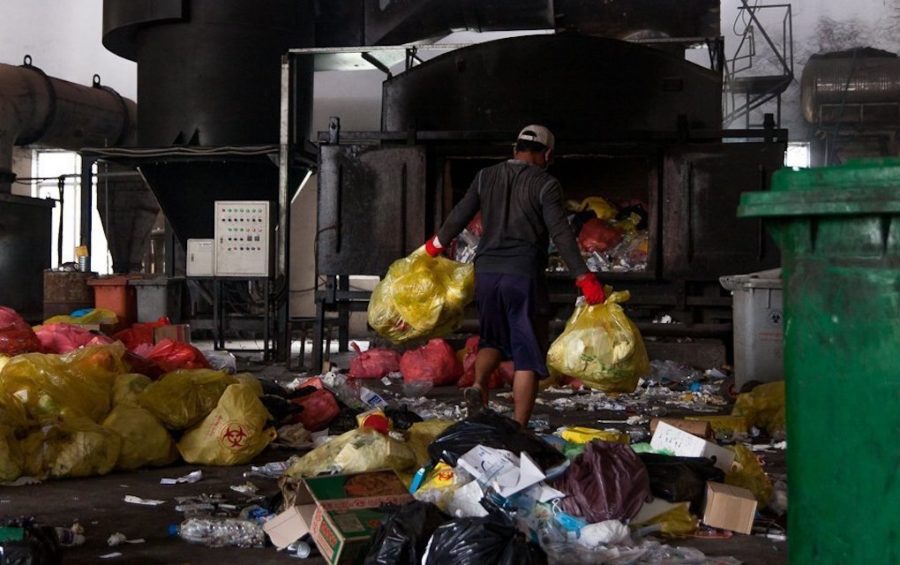There is an audible crunch underfoot — the distinct sound of a syringe shattering — but Nguon Sokheng pays it no mind. After all, he has been working at Phnom Penh’s Dangkor landfill site for 10 years. Crushing medical waste under his sandals is commonplace.
As he navigates the litter-strewn warehouse floor and heads toward an industrial incinerator with two yellow plastic bags bearing biohazard symbols, one bag splits and a slew of medical refuse pours out onto the floor. Armed with little more than red rubber gloves and a face mask, Sokheng scoops up the spilled pile of gloves, bandages and assorted bottles with his hands before tossing them into the incinerator.
“We need better equipment,” he says as he shuts the incinerator doors. “These gloves are so thin, they rip easily. We’re always so close to all this medical waste. I don’t know which bits are dangerous, which ones are infectious. Any single piece might endanger our lives, especially when we’re working by hand.”
On the outskirts of Phnom Penh’s Dangkor district, there are few signs of life at the landfill site. A mountain of garbage collected by municipal sanitation workers sits just a few hundred meters away, but the facility where Sokheng works is operated by the Medical Waste Management Unit (MWMU), an offshoot of the Cambodian Red Cross, which has been responsible for disposing of all the capital’s medical waste since 2009.
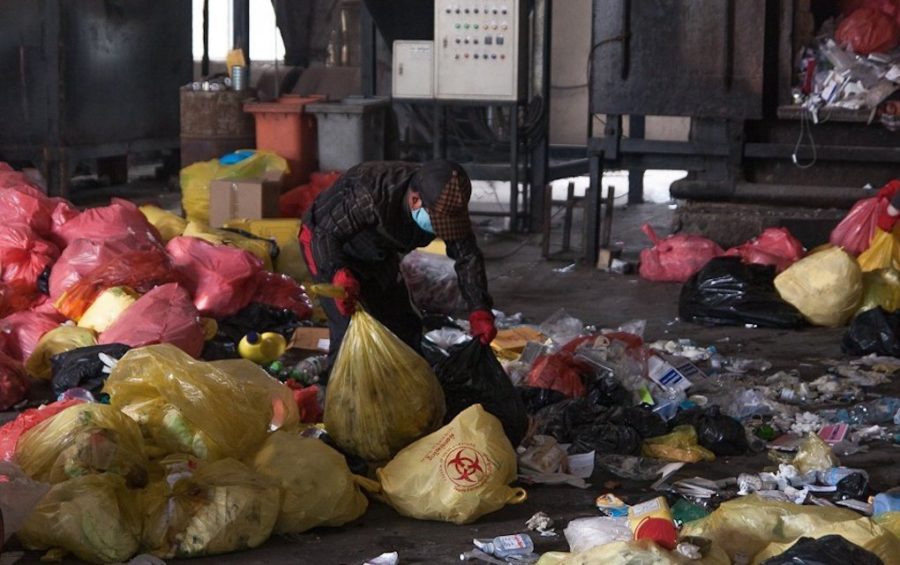
Sokheng is one of five men responsible for the disposal of the entirety of Phnom Penh’s medical waste, which they pick up from more than 2,000 medical facilities around the capital. Four of the five men operate two incinerators at the landfill that burn through two metric tons of medical waste each day, working Monday to Saturday.
While their job was already thankless, since Cambodia confirmed its first case of Covid-19 in January, and dozens more in March and April, the team’s mood has grown increasingly tense. The workers say they are poorly equipped, uninsured and in harm’s way of infection, but few people are aware of the risks they take.
“The government is telling everyone else to stay home, stay safe, but we still have to show up every day with no support,” Sokheng tells reporters this month. “They need to think about us too. We face these dangerous conditions every day and yet we get nothing. There’s just no support from the government or from the stakeholders.”
Behind him, plumes of black smoke belch out of the incinerators’ chimneys.
“This is all we got from the government,” he says, holding up a household surface cleaner bottle filled with hand sanitizer.
‘More at Risk Than Most Doctors’
Medical waste disposal is a “key part of pandemic planning and recovery,” but many developing countries in Asia lack proper facilities and regulations for the handling and disposal of medical and hazardous waste, according to experts from the Asian Development Bank (ADB).
“Hazardous waste is often openly burned, comingled with municipal solid waste, illegally recycled and resold, posing significant threat to both the health of the handler and the environment,” energy specialist Stephen Peters and investment specialist Christine Chan from ADB wrote in March, adding that outdated facilities should be updated to avoid toxic emissions and generate clean energy from waste.
Sokheng, 30, explains that nobody on his team has health insurance, despite dealing with an array of hazardous materials for nine hours a day, six days a week. He earns just $250 a month for taking these risks, and now he fears he could catch Covid-19 and infect his wife and three children, who live together in a single rented room in Phnom Penh.
“There’s no way for me to quarantine myself after work. My wife and kids keep telling me to quit because they’re afraid I’ll get sick, but what other job can I do? My family need my support and yet, if I get sick then nobody will support me,” Sokheng says.
Last year, one of Sokheng’s colleagues died from a suspected lung infection at the age of 31. The other MWMU workers believe it was the product of working regularly around the incinerators since 2012, according to Sokheng.
MWMU’s deputy director says the unit is not certain what killed the man, but noted that the unit provided $150 for the worker’s medical treatment and $300 for his funeral. The 31-year-old was never replaced, leaving his four colleagues with one fewer pair of hands to shovel refuse into the incinerators.
As Sokheng speaks about his dead coworker, there is a loud popping sound from an incinerator chimney. A shower of charred medical waste erupts into the sky and rains down in blackened clumps around workers sitting at an outdoor table about 100 meters from the building housing the incinerators.
“These things happen,” Sokheng says as people take cover under a tree.
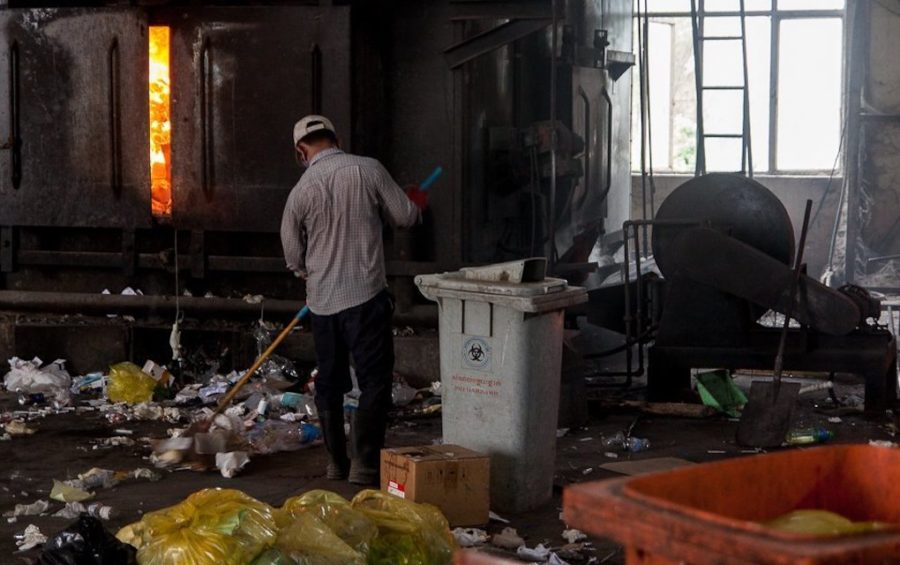
On multiple occasions, he has requested an excavator from the MWMU so that he doesn’t have to pick up potentially infectious waste with his hands. These requests were denied, with a supervisor saying the unit didn’t have the funds, he says.
“The National Anti-Covid-19 Committee had no trouble raising plenty of donations, but we haven’t seen any of it and, if anything, we’re more at risk than most doctors — at least they only work at one hospital and have plenty of protection. We get the waste from every hospital and health center in the city and we don’t even have enough protective boots or gloves. We have to share them,” Sokheng says, gesturing at a pair of red rubber gloves being sprayed with an alcohol-based sanitizer so that they can be reused.
Established in mid-March, the National Anti-Covid-19 Committee is chaired by Prime Minister Hun Sen and includes representatives from a range of government ministries, as well as provincial governors and senior military officials.
After Hun Sen pledged seven months of his $2,500 monthly government salary to the committee’s Covid-19 response and prevention campaign, a number of officials followed suit, including newly appointed Justice Minister Keuth Rith, Telecommunications Minister Chea Vandeth, Environment Minister Say Samal and Land Minister Chea Sophara.
As of early April, pledged donations to the campaign totaled more than $10 million following contributions from private donors, although the committee’s specific sources of income could not be verified.
Seng Tieng, an assistant to Hun Sen and a member of the committee, declined to answer questions about donors and referred a reporter to the Health Ministry, which he said was receiving the donations. Multiple ministry officials did not reply to repeated requests for comment.
Another MWMU employee at the landfill, who wished to be identified only as Kimsoam, agrees that the unit is underfunded, with employees overworked and increasingly fearful of catching Covid-19.
“We’ve always worked with hazardous waste. All medical waste is potentially dangerous, but Covid-19 infects people so easily and we have no special equipment to deal with it,” says 38-year-old Kimsoam.
His recent request for full-body protective gear was also denied due to lack of funds.
‘If It’s Too Dangerous, They Will Quit’
Collecting waste from 2,214 medical facilities around the city, the MWMU employs 37 people in total, with just four working at the Dangkor landfill. The medical waste is incinerated at 1,200 degrees Celsius and the ash is buried onsite, but separately from the municipal waste.
The U.N. Environment Programme (UNEP) warns of the potential health implications of leftover ash from medical waste in a 2018 report that was updated earlier this year.
“The disposal of clinical waste is a matter that every country ordinarily faces but which poses greater challenges in times of a pandemic, especially in countries that may lack the capacity to dispose of hazardous wastes in a manner that will protect human health and the environment,” says Charlie Avis, a spokesman for the Secretariat of the Basel, Rotterdam and Stockholm Conventions at the UNEP when asked about Cambodia and other Southeast Asian nations’ capacity to deal with waste produced by their Covid-19 response.
The Basel Convention, which Cambodia became a party to in 2001, aims to control the transboundary movement of hazardous waste and its disposal. According to Avis, any party to the convention that lacks the technical capacity to dispose of medical waste can request for it to be exported for suitable disposal.
Asked whether Cambodia has the capacity to dispose of medical waste safely, Avis refers questions to Heng Nareth, director-general of the Environment Ministry’s Department of Environmental Pollution Control and Cambodia’s Basel Convention representative.
Nareth could not be reached for comment, but ministry spokesman Neth Pheaktra maintains that Cambodia is capable of adequately disposing of medical waste, particularly during the Covid-19 pandemic, and as such hasn’t needed to request international assistance.
“All medical waste from private clinics and hospitals has been collected and sent for incineration [and is] controlled by the Cambodian Red Cross,” he says, adding that state hospitals have their own incinerators and all were considered environmentally sound by the ministry.
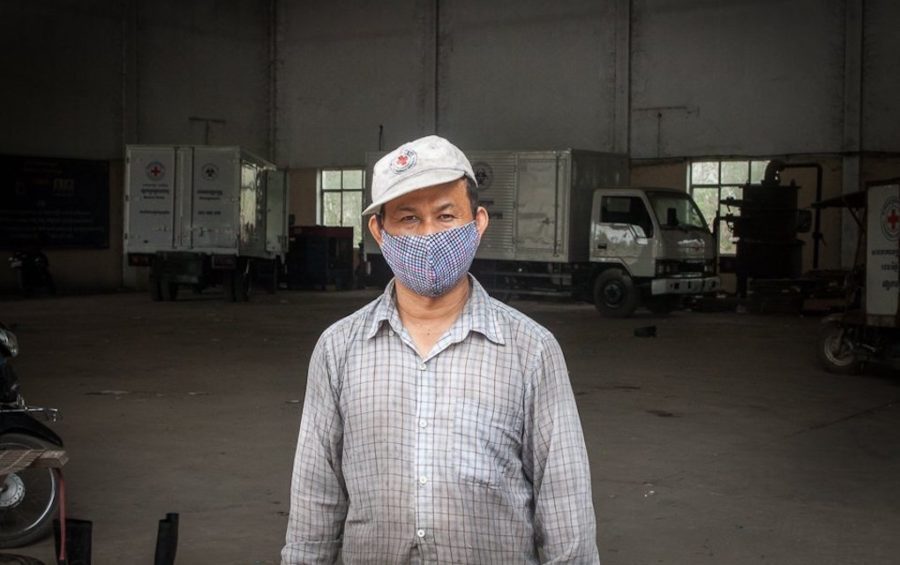
The Covid-19 public health crisis has spurred further guidance from the UNEP, which released a statement in March warning that pandemics generate more hazardous medical waste and that unsound disposal methods can create unforeseen health and environmental consequences.
Disposing of waste in a pandemic is far from simple, explains So Simarong, MWMU’s deputy director, who says he is struggling to keep his small team going under the strain of Covid-19.
“Since the pandemic started, the number of patients is increasing, but so far the volume of waste remains about the same. The problem is we don’t know how much worse things will get,” he says.
As of April 28, the Health Ministry has not announced a new Covid-19 case in more than two weeks, leaving the total number of infections since January at 122. All but three patients have been reported as recovered and been allowed to leave medical quarantine. No coronavirus-related deaths have been confirmed in Cambodia.
But, if the Covid-19 outbreak spreads and case numbers rise, the virus could outpace the country’s health care system, and the MWMU’s capacity for waste disposal.
Staff are on the verge of walking out, citing the growing risk to their health when handling waste from facilities that are dealing with Covid-19 contaminated materials, Simarong says. Even in his Phnom Penh office, some 8 kilometers from the landfill site, the mood is uneasy.
“The staff all feel very uncomfortable about the level of risk they’re being asked to take on. So far I’ve convinced them to stay. The hospitals need them, the city needs them, but ultimately, if they feel it is too dangerous they will quit and who will deal with all this waste?” he says.
‘Buying Everything Ourselves’
Another issue is funding. As part of the Cambodian Red Cross, the MWMU operates as a private service provider and their 2,214 contracts net somewhere in the region of $12,000 per month, Simarong says.
Fees are broken down by facility: a public health center is charged $90 per month, provincial hospitals pay $150, whereas private establishments typically pay more. Kantha Bopha IV Children’s Hospital in Phnom Penh, for example, pays $950 each month for the MWMU’s services, whereas Pasteur Institute in Cambodia, the laboratory and research institute where samples are tested for Covid-19, pays $800 monthly.
Public hospitals Khmer-Soviet Friendship Hospital, where Covid-19 patients are treated, and Calmette Hospital each pay $900. All fees are set by the Health Ministry, according to Simarong, who says the prices are based on the number of beds per hospital — but there’s a catch.
“Our outfit doesn’t make any money from this. Once we take out our operating costs, anything left over has to be donated back to the Cambodian Red Cross,” he says.
The Cambodian Red Cross has been headed by Hun Sen’s wife, Bun Rany, since 1998 and has faced scrutiny for alleged politicization of humanitarian aid for years, including Rany’s promotion of the ruling Cambodian People’s Party (CPP) during charitable events.
London-based corruption watchdog Global Witness reported in 2016 that the Cambodian Red Cross functions as a “microcosm of Hun Sen’s patronage system,” and its board and donors include many of the Hun family’s business associates, CPP officials and their family members.
The Cambodian Red Cross is a member of the International Federation of Red Cross and Red Crescent Societies (IFRC), which describes itself on its website as the “world’s largest humanitarian network” — guided by fundamental principles, including impartiality, neutrality and independence.
As a “National Society,” the Cambodian Red Cross and its personnel, like all IFRC members, are bound to Red Cross principles, says IFRC spokeswoman Preeti Abraham.
“However, it is important to note that National Societies are also auxiliaries to their public authorities. It is normal that National Societies work closely with their governments in the humanitarian field,” she adds.
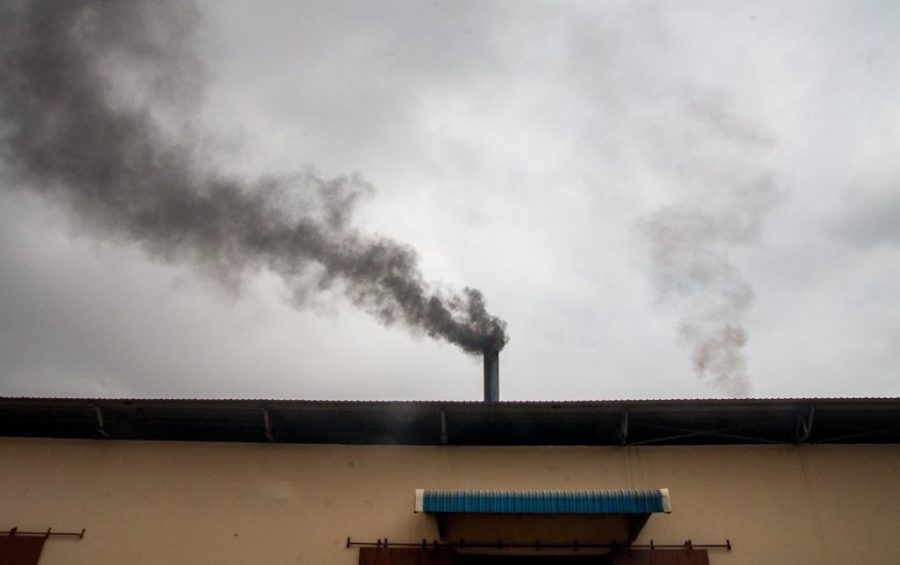
In a normal month, Simarong explains that the MWMU usually returns approximately $2,000 to the Cambodian Red Cross, but Covid-19 has raised the unit’s operating costs in recent months.
More money is needed to disinfect the front-line staff, along with their vehicles and equipment, according to Simarong. The unit has bought 90 liters of alcohol for sanitizing as well as “enough” face masks, although Simarong did not say how many exactly.
Medical facilities have to separate their Covid-19 waste, treat it and store it for a week before the MWMU collection teams can pick it up, meaning logistics are less efficient, he adds.
“The Cambodian Red Cross is an NGO. It’s not under the Ministry of Health and we don’t enjoy the government connections that people think, but we do the best we can with the resources we have,” says Simarong, adding that he urgently needs better personal protective equipment for his front-line staff, as well as a new incinerator.
When asked later about the charcoal-like pieces of burned medical waste that rained down from the incinerator vents, he says the incinerators are not cheap, but they are also not the best-quality machines and “not 100 percent clean.”
The Dangkor site has two incinerators, one that the MWMU bought from China in 2016 for $60,000, and a more modern $80,000 French incinerator that has a filtration device designed to reduce emissions, but this was only added to the site last year. Simarong says that these were both afforded with no government assistance and were paid for by the Cambodian Red Cross using money generated by the MWMU.
“Nobody cares about this kind of work,” he says. “The government could ask for international assistance, but of course they never do. We have to buy everything ourselves. I want better wages for my staff. I want better protection for my front-line workers. I’ve asked the government before, but they just don’t care.”
Khuong Sreng, chairman of the Cambodian Red Cross committee in Phnom Penh, declined to comment.
Improper Disposal
According to the October 2018 Phnom Penh Waste Management Strategy and Action Plan 2018-2035, health care facilities are responsible for the separation of medical waste by category, but separation practices are limited — even absent in some health care facilities — meaning medical waste is often not disposed of correctly.
The report said that 70 percent of medical waste was infectious, 20 percent pathological (mostly biological waste generated from surgery) and 10 percent consisted of sharps and other waste in 2017. Collectively, this amounted to 40 metric tons per month at the time.
A 2019 report from the European Chamber of Commerce in Cambodia and German development agency GIZ also noted the problem, explaining that medical waste is increasing in Cambodia due to an expanding health care sector. It added that medical waste is often mixed with general waste and ends up buried and untreated in municipal landfills.
The report went on to suggest that despite the MWMU’s efforts in Phnom Penh, Cambodia as a whole fails to address medical waste management effectively. Even though some hospitals have in-house incinerators, those that have such facilities fail to follow best practices, the report says, while presenting the problem as a gap in the market that European companies could address.
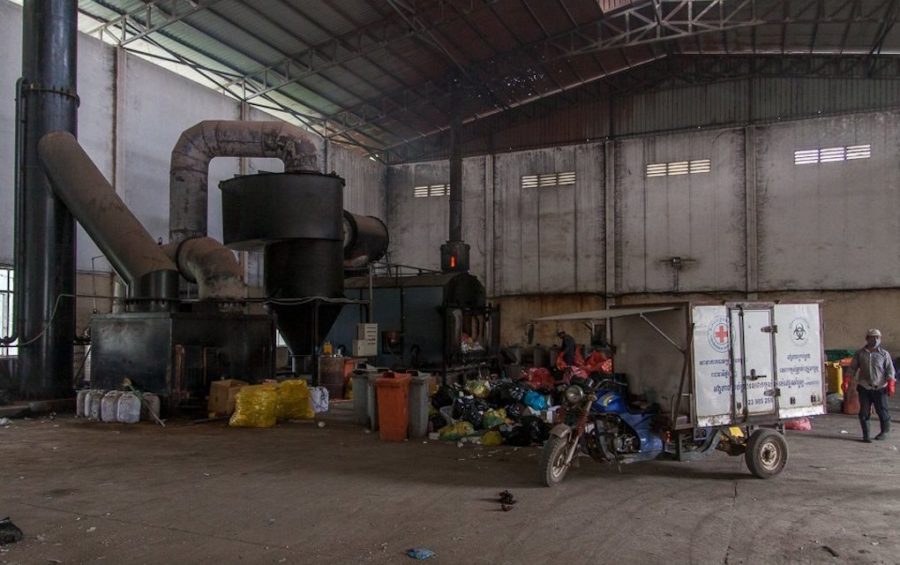
“We see that the sector is very dynamic and that many things are changing for the better,” GIZ private sector coordinator Bianca Untied says in an email. She added that the Cambodian government has the political will to address challenges presented by medical waste.
“Rapid economic growth has meant that waste management systems have not been able to keep up. We see a huge potential for private sector engagement once the business case is there. Good waste management needs financial resources,” she says.
But for now, Phnom Penh’s medical waste disposal agency remains in need, with workers saying they continue to take out the trash, and burn it, without the protective equipment that could lessen health risks.
Kimsoam, one of the workers, says he has been on the job for more than a decade, but this year is different.
“Every day we’re here, we’re at risk because we’re using our hands to sort through the waste. We don’t even know what waste has come from which hospital, let alone whether it’s been treated properly,” he says. “But in the 11 years I’ve worked here, I’ve never been as afraid as [I am] right now.”
Note: The author reported this story with a Cambodian journalist who requested their name not be included due to fears of reprisal.
This article was produced by New Naratif and VOD, who have partnered to publish long-form journalism from Cambodia that empowers our shared community with news and information.
Note: This report was produced with support from the Rosa Luxemburg Foundation under the financial support of the German Federal Ministry for Economic Cooperation and Development.



